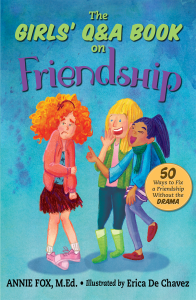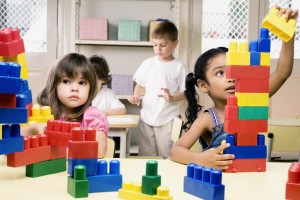This question was asked of me on my current Girls’ Q&A Book blog tour, by Deborah McNelis, educator and founder of Brain InSights.
Deborah: Is there an aspect of friendships that you find to be most common from girls?
Annie: Yes! A common thread weaves its way through most girl friendship conflicts and makes girls feel trapped in uncomfortable peer relationships. It’s a misconception many girls have about their role in a friendship– a bizarre assumption that: “If I speak up for myself in a friendship, I am not being a good friend.” This creates huge problems for girls because when they are upset, they need to express themselves effectively and appropriately to their friend. (Talking behind her back doesn’t count as effective communication!)
Because girls are often unwilling and/or unable to initiate those necessary conversations, they feel miserable and complete stuck in their misery. They believe a “good friend” should never tell a friend something negative because then she will hurt the friend’s feelings. And that’s mean. So, if I, Annie, am hurt by something my bff Deborah did, I can not tell her, otherwise I will not be a good friend. But Deborah is not a mind reader. If I stay silent, Deborah has no way of knowing how I feel. My silence will, in fact, send the message that it is OK for her to continue treating me badly, even though it is not OK! My silence also leaves me feeling upset and powerless, not realizing that I do have power to change my response to this situation.
There is no girls’ friendship drama that can’t be made WORSE… through staying silent, venting behind a friend’s back, or pretending things are just peachy. Since we’re here to help girls make things better, one way is to give them opportunities to talk things through with us parents and teachers. Another is to do actual role play with them to boost their confidence in having these honest conversations. And finally, it’s our job to help them realize that they are never without options for feeling better about themselves in any relationship.
Every Friday at #GirlDramaChat we discuss girls’ friendship challenges and smart strategies for teaching them compassion, respect, and social courage. Follow me @GirlDramaChat for updates.













